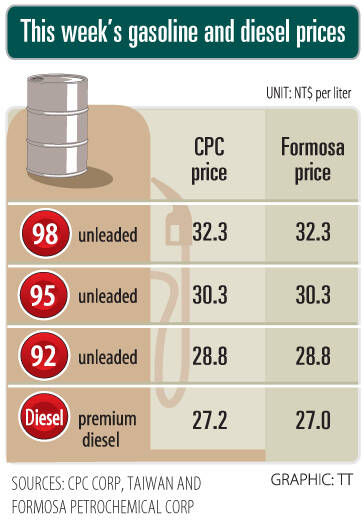The nation’s two major refiners yesterday announced that they would raise gasoline and diesel prices by NT$0.2 per liter from today, ending five weeks of price cuts.
Following the adjustments, domestic gasoline prices at CPC Corp, Taiwan (CPC, 台灣中油) and Formosa Petrochemical Corp (台塑石化) stations are to rise to NT$28.8, NT$30.3 and NT$32.3 per liter for 92, 95 and 98-octane unleaded gasoline respectively.
Premium diesel would cost NT$27.2 per liter at CPC stations and NT$27 at Formosa pumps.

The increases come even as international crude oil prices fell last week compared with the previous week, CPC and Formosa said in separate statements.
Front-month US West Texas Intermediate crude oil futures edged up 0.33 percent to US$69.49 per barrel on Friday, but declined 3.19 percent in the week, while Brent crude oil futures rose 0.4 percent to US$73.1 per barrel on Friday, falling 3.35 percent for the week, Dow Jones Newswires reported on Saturday.
The global oil market experienced a volatile week of trading last week, with crude prices falling earlier last week, as the Israeli military’s recent airstrikes on Iran avoided Iranian oil facilities, CPC and Formosa said.
However, it rose later in the week amid market speculation that OPEC+ could delay next month’s planned oil production increase by a month or more.
However, this week’s average price levels are still lower than the previous week’s, they said.
Separately, prices of liquefied petroleum gas (LPG) products, including household and automotive LPG, propane and butane, as well as propane and butane mixes, would remain unchanged this month, CPC said.
Liquefied natural gas prices for retail users would also stay the same this month, although prices for industrial users would rise 3 percent from last month, it added.

MULTIFACETED: A task force has analyzed possible scenarios and created responses to assist domestic industries in dealing with US tariffs, the economics minister said The Executive Yuan is tomorrow to announce countermeasures to US President Donald Trump’s planned reciprocal tariffs, although the details of the plan would not be made public until Monday next week, Minister of Economic Affairs J.W. Kuo (郭智輝) said yesterday. The Cabinet established an economic and trade task force in November last year to deal with US trade and tariff related issues, Kuo told reporters outside the legislature in Taipei. The task force has been analyzing and evaluating all kinds of scenarios to identify suitable responses and determine how best to assist domestic industries in managing the effects of Trump’s tariffs, he

TIGHT-LIPPED: UMC said it had no merger plans at the moment, after Nikkei Asia reported that the firm and GlobalFoundries were considering restarting merger talks United Microelectronics Corp (UMC, 聯電), the world’s No. 4 contract chipmaker, yesterday launched a new US$5 billion 12-inch chip factory in Singapore as part of its latest effort to diversify its manufacturing footprint amid growing geopolitical risks. The new factory, adjacent to UMC’s existing Singapore fab in the Pasir Res Wafer Fab Park, is scheduled to enter volume production next year, utilizing mature 22-nanometer and 28-nanometer process technologies, UMC said in a statement. The company plans to invest US$5 billion during the first phase of the new fab, which would have an installed capacity of 30,000 12-inch wafers per month, it said. The

Taiwan’s official purchasing managers’ index (PMI) last month rose 0.2 percentage points to 54.2, in a second consecutive month of expansion, thanks to front-loading demand intended to avoid potential US tariff hikes, the Chung-Hua Institution for Economic Research (CIER, 中華經濟研究院) said yesterday. While short-term demand appeared robust, uncertainties rose due to US President Donald Trump’s unpredictable trade policy, CIER president Lien Hsien-ming (連賢明) told a news conference in Taipei. Taiwan’s economy this year would be characterized by high-level fluctuations and the volatility would be wilder than most expect, Lien said Demand for electronics, particularly semiconductors, continues to benefit from US technology giants’ effort

‘SWASTICAR’: Tesla CEO Elon Musk’s close association with Donald Trump has prompted opponents to brand him a ‘Nazi’ and resulted in a dramatic drop in sales Demonstrators descended on Tesla Inc dealerships across the US, and in Europe and Canada on Saturday to protest company chief Elon Musk, who has amassed extraordinary power as a top adviser to US President Donald Trump. Waving signs with messages such as “Musk is stealing our money” and “Reclaim our country,” the protests largely took place peacefully following fiery episodes of vandalism on Tesla vehicles, dealerships and other facilities in recent weeks that US officials have denounced as terrorism. Hundreds rallied on Saturday outside the Tesla dealership in Manhattan. Some blasted Musk, the world’s richest man, while others demanded the shuttering of his